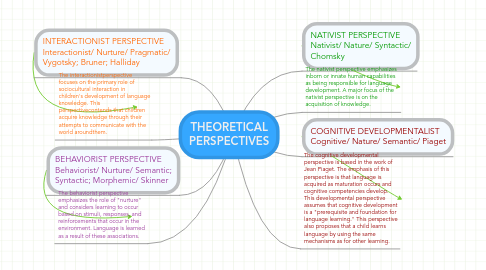THEORETICAL PERSPECTIVES
by John Valadez Jr

1. BEHAVIORIST PERSPECTIVE Behaviorist/ Nurture/ Semantic; Syntactic; Morphemic/ Skinner
2. INTERACTIONIST PERSPECTIVE Interactionist/ Nurture/ Pragmatic/ Vygotsky; Bruner; Halliday
3. The interactionistperspective focuses on the primary role of sociocultural interaction in children's development of language knowledge. This perspectivecontends that children acquire knowledge through their attempts to communicate with the world aroundthem.
4. The behaviorist perspective emphasizes the role of "nurture" and considers learning to occur based on stimuli, responses, and reinforcements that occur in the environment. Language is learned as a result of these associations.
5. COGNITIVE DEVELOPMENTALIST Cognitive/ Nature/ Semantic/ Piaget
6. NATIVIST PERSPECTIVE Nativist/ Nature/ Syntactic/ Chomsky
7. The nativist perspective emphasizes inborn or innate human capabilities as being responsible for language development. A major focus of the nativist perspective is on the acquisition of knowledge.
8. The cognitive developmental perspective is based in the work of Jean Piaget. The emphasis of this perspective is that language is acquired as maturation occurs and cognitive competencies develop. This developmental perspective assumes that cognitive development is a "prerequisite and foundation for language learning." This perspective also proposes that a child learns language by using the same mechanisms as for other learning.


